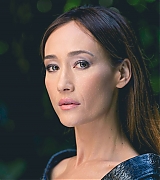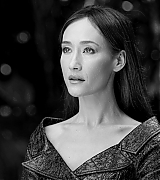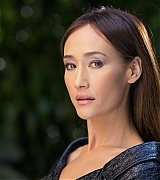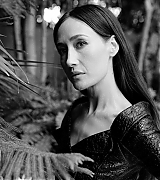One’s returning to TV, another is switching shows and they all have a lot to say about fight scenes, Twitter and going incognito at the annual convention.
Fans of Sarah Michelle Gellar may be surprised to hear that they could find themselves sitting next to her in ballroom 20. The last time the former Buffy the Vampire Slayer star attended Comic-Con, she did so in costume.
That’s one of many revelations to come out of our June 24 conversation with Gellar (the CW’s suspense thriller Ringer), Jennifer Morrison (ABC’s fairy tale drama Once Upon a Time), Britt Robertson (the CW’s supernatural series The Secret Circle), Yvonne Strahovski (NBC’s Chuck), Maggie Q (the CW’s Nikita) and Anna Torv (Fox’s Fringe).
After the actresses posed for what can only be described as a fanboy’s fantasy, they gathered at the Montage Hotel to discuss the demands of the TV business, the advantages (and disadvantages) of genre TV and the keys to surviving Comic-Con in a no-holds-barred conversation moderated by THR’s Lacey Rose and Borys Kit.
The Hollywood Reporter: Some of you are on shows that are not yet on the air but already have this incredible buzz. How does that feel?
BRITT ROBERTSON: It’s a cool thing. We’re working with Kevin Williamson, who did The Vampire Diaries. It has a sort of cult following, and I think because of that, and since we are sort of its sister show, people are excited for The Secret Circle. I guess we’re just hoping that we don’t let people down.
THR: Does that put more pressure on you?
JENNIFER MORRISON: Our show is from the writers of Lost, and it’s at ABC, so there’s all of this pressure to live up to Lost — the fan base, the hype. But it’s also exciting because you know you are working with people who are really good at what they do and have been very successful at it before.
SARAH MICHELLE GELLAR: I definitely feel pressure. It’s not outside pressure; it’s pressure because the fans have been so loyal, you want to … make them happy. There’s definitely something to be said for being the quiet show that gets to build on its own merit, as opposed to an expectation that already exists.
MAGGIE Q: I think that’s because with you, you have a big fan base and you have been very successful. So people are actually excited to see you come back to TV. No pressure.
ROBERTSON: Just don’t let us down, OK?
THR: A lot has changed since Buffy the Vampire Slayer. You have less time to find an audience the way Buffy did, for instance, and Comic-Con certainly isn’t what it was 10 years ago.
GELLAR: No, when we started, I don’t think we even really knew what Comic-Con was. It was just genre-specific shows. Now you hear about a panel, and you have no idea what it actually has to do with Comic-Con. But it’s pretty incredible. I always say to actresses, if you haven’t been — this is going to sound really funny — but get a mask and take a look around. I’m serious. For most of us, it’s our first week of shooting, and you have no time. You get rushed into your panel and you come out of the backside, and you never actually see the main hall. It’s pretty amazing.
ROBERTSON: So you get a character mask?
MORRISON: It’s normal for anyone to walk around in masks.
GELLAR: Yeah, it’s really incredible to see, even for 20 minutes.
THR: Did you put on a costume and go in?
GELLAR: Possibly … (Laughs.)
MORRISON: She can’t give her secrets away!
ANNA TORV: I went and had a look around the first year that I went down there. The show wasn’t on the air yet and everybody was at our panel to hear J.J. [Abrams] speak, so I was quite fine to go and have a look. And then, you know, it changes bit by bit. It’s one of the few opportunities that you actually get to sit and talk to people who watch your show and have an interaction with them.
THR: Britt and Jennifer have never been to Comic-Con. Any other advice for them on how to survive it?
ROBERTSON: Yeah, bring it on. What can you tell us besides the masks?
GELLAR: I think I gave my best advice … I think it’s different when you’re going with a new show because it is hard. You don’t want to raise expectations to a level that you can’t meet.
MORRISON: And you want to bring that audience in. You want to say what you should say to have them want to watch.
Q: This year, you’ll say, “It’s going to be this”; “It’s going to be that.” Next year when you come back, it’s going to be great. People who come are already going to be fans of the show. So you’re going to be answering specific questions about the show, which is much more fun than trying to be like, “It’s not going to suck, I promise.”
MORRISON: For the record, my favorite fairy tale growing up was Cinderella. I’ve been asked 8,000 times. I’m sure I’ll be asked 8,000 more times.
Q: Or somebody asks 8,000 times: “Could you really beat someone up in a bar?” “Do you think you could really kill someone?” I’m like, “I think anyone can kill someone.”
GELLAR: I still get that question.
Q: I think to myself, “I could beat you up right now.”
GELLAR: I think I’ve actually answered with that before.
Q: Oh, have you? I’m going to steal your line.
THR: What is the best or craziest fan encounter you’ve ever had?
YVONNE STRAHOVSKI: I was at New York Comic-Con. I was the only castmember with our two creators, and somebody came up and gave me a teddy bear, and then it sort of started this whole thing where people wanted to gift me things at the table.
GELLAR: I’m a size 6-1/2 shoe …
Q: I love jewelry!
MORRISON: If you bring me jewelry, I will tweet you back.
ROBERTSON: I just started [tweeting] two days ago. It’s scary.
TORV: I did it on our showrunner’s account. I can’t believe how the world changes.
THR: Do you have to tweet on behalf of your shows?
ROBERTSON: It’s such a huge thing now. Social networking … really contributes to our numbers and fans and it just gets the word out there, so people are really into it. I’m trying to embrace it, but it’s really scary.
STRAHOVSKI: I was like that at the beginning. I was scared of it, too.
Q: Facebook? I have no clue about it. MySpace, none of that. I’m the worst.
GELLAR: I think one thing for me coming back into this world is that I have to embrace the whole social networking. It’s a way to get stuff about the really important parts of your show out and to include your fans. At the same time, I’m an incredibly private person. I have a family, and it’s hard to sort of figure out what that balance is. … I used to tell people, “Don’t read message boards.”
TORV: I think genre shows are really the only place where it is so beneficial. I know that our writers, producers and showrunners sit and read Twitter and check out all of the boards, and it becomes this intellectual dance with the fans.
GELLAR: But it’s also like, “He who speaks loudest gets heard.”
TORV: You have always gotten feedback, but it’s just so instantaneous now. I think that the filter they use is still the same filter that they would have used before. It’s like everyone had such a big issue with reality TV when it first happened. It was like, “Oh my God, reality TV.” But you look at it, and here we are. It means that scripted drama has to get better.
Q: It has to be more reality-based than it ever has been …
TORV: Well, no, I think it means that it could be heightened. I think what it means is because there is a lot of that reality stuff, you don’t want to watch shows where people just stare at each other and say, “Yeah, then he dumped me.” You want to watch stuff that’s emotionally uplifting, heightened, fantastical or sci-fi.
THR: If you could do a superhero show, which would you do?
GELLAR: Don’t feel pressure to say Buffy, guys.
THR: They tried to do a Wonder Woman pilot, and it failed.
GELLAR: Don’t say failed. That’s not fair to all the people who worked hard on it.
THR: It didn’t get picked up. But is there a way to make Wonder Woman work in the 21st century?
TORV: Oh gosh, that’s what I used to play when I was little. I would run to the end of the street.
THR: She’s clearly an inspiration. Why can’t they make a movie or TV show that seems to work for modern audiences?
GELLAR: Female is hard. That’s the thing: There’s a lot of pressure and the box office is still dominated by male-superhero movies, and a lot of times there’s an attitude that Wonder Woman is strong, but Superman would still beat her.
STRAHOVSKI: Maybe the superhero thing is sort of fading out. I feel like all the vampire stuff is moving in, and the fairy-tale stuff now is taking over. … I don’t know if it was the right time for Wonder Woman.
MORRISON: I also feel like there’s just so much more attention on that project. There are however many other pilots that didn’t get picked up, yet it’s, ‘Wonder Woman failed.’
GELLAR: And it doesn’t mean that the show isn’t good.
Q: The 1970s Wonder Woman was sort of a kitsch thing. It was a very specific time for that, and it’s hard to modernize something like that. They tried to modernize the outfit, and it’s pretty tough. … You can’t have a woman running around in her underwear now. You can’t do that. In the ’70s, it was OK.
MORRISON: You need someone who has the kind of vision that a Jon Favreau has. Look at what he did with Iron Man. He took a strong point of view and had a superhero have a sense of humor about himself, and it really worked to translate it to the audience right now. Granted, that was a male superhero, but you need to have someone who has that kind of vision to be able to rework a story like that — and then you have to have the right actor, the right production designer, the right everything.
GELLAR: Joss [Whedon] tried Wonder Woman. If there’s anyone who writes female, knows female superheroes and really knows how to make them accessible for everybody, it’s Joss, and he struggled with Wonder Woman, too. So it seems like that is a difficult one to tackle.
THR: Has time passed her by, perhaps?
MORRISON: No, she’ll find her moment. I feel like all of those things find their moment. It is just that now is not her moment.
Q: You know, if it ends with Lynda Carter, so be it. She did it right.
THR: For many of you, these are new or recently renewed shows. Take us back to the moments before you got the official word. What were you feeling?
GELLAR: Oh, it’s cruel. It’s cruel. It’s the worst process. You are literally standing by a phone and they really don’t tell you until the night before, unless you are in New York. You are literally waiting, and you don’t want to pack a suitcase. I think what they do is secretly have all of the flights reserved under all of the actors’ names who they might pick up. I remember having to give all of our information ahead of time
ROBERTSON: It’s so funny that they do it so late in the process.
Q: The CW, especially!
TORV: The casting as well. You get cast two, three days before you’re about to shoot. And establishing a character at that point that you don’t realize you could play for four years, it’s like, my goodness!
GELLAR: I signed with Buffy the day before the first production meeting.
THR: At this stage, how involved are you in crafting the storylines for your characters?
GELLAR: I’m an executive producer on our show, and I’ve been with it since we created it. So I probably have a little bit more depth, but at the same time I don’t bill myself as a writer.
MORRISON: With Once Upon a Time, it’s been really nice. Eddy Kitsis and Adam Horowitz are the showrunners, and they’re really inclusive and really collaborative, so it’s been a lot of asking us what we think and how we feel. … When you sit down and talk with them about the show, it’s like they’ve watched six years of it already. There’s so much detail in how all these worlds cross over and how these fairy-tale characters exist … but in terms of all of the little details of who they really are, their pasts and how they react to things, they’re very inclusive. It’s so different for me because on House, it was very much like, “Here’s what you do,” and you just listen and do it. On Once Upon a Time, it’s been sort of like: “Oh, you want to know what I want to wear? Here’s some pictures I was thinking about …”
GELLAR: Does that mean you never get to wear the fairy-tale outfits?
MORRISON: Well, someday I think I will end up being in a fairy tale. … I am full-blooded fairy tale, but I’ve just lived in reality my whole life. I’m the child of Snow White and Prince Charming, I’ll have you know.
Q: They had sex?
MORRISON: They got married!
GELLAR: It would be better if it were like Prince Charming and Aurora from Sleeping Beauty.
Q: Or Ariel from The Little Mermaid.
THR: What is the most personal piece that is infused into your characters?
STRAHOVSKI: The physical aspect. … I’ve always been a bit of a tomboy, so I think all of the action and stunts have always been a part of me. I love doing that stuff, and now my character has sort of evolved from being very comfortable in the spy world but not very comfortable with being a normal person with family and a boyfriend and stuff. She’s evolved into a more natural human being and more easygoing in social situations. It’s nice to be bringing that into it … to be more normal on the show but still being the spy.
ROBERTSON: The interesting thing with genre-specific TV is that the writers are really the people who you have to rely on. … It’s strange because I have no idea what I’m saying on a regular basis, so it forces you to be more vocal with the writers and the creative process.
GELLAR: I’ll teach you the trick to that.
ROBERTSON: Will you, please?
GELLAR: The truth is that in any of these worlds, whoever says it first makes up the name. No matter what it says in the script, you say it first and everybody else has to say it. … Even if it’s not in your dialogue, work in the name of whatever the warlock is for that week.
ROBERTSON: I like it. I like it.
THR: What is the biggest challenge or frustration of working in the TV business, for you?
MORRISON: The hours on a drama are just nasty.
Q: I worked for a producer on my show who Sarah worked with on Buffy. It was like six months in, and I wanted to kill myself …
GELLAR: Ah, Buffy the Weekend Slayer. … The thing I’m grateful for is that I don’t have to do the stunts anymore. In the Ringer pilot, I was the one who got knocked down. My entire stunt was getting knocked around. The producers and directors were so nervous; they wanted to use the stunt double and use pads.
Q: The physicality is so hard. It is the hardest thing you can do. Then you also get a 60-page script every nine days, and you’re the lead and you’re doing action. It’s almost impossible. I nearly had a meltdown in the first season.
TORV: You can surely get hit in the head and go into a coma, can’t you?
Q: Right? Or do that to myself.
STRAHOVSKI: I thought it was illegal when I first came here from Australia. … Long hours make it interesting. You have to do a fight scene at like 5 a.m.
THR: Some of you have played very iconic characters before this. How important is it to separate yourselves from those characters as you dive into these new projects?
MORRISON: As an actress, it’s nice to look for something different. It was wonderful playing Cameron on House for all of those years — amazing writing and an incredible cast. I have no complaints, but it was also exciting to be let free and to play new characters and try something new. And part of the appeal of Once Upon a Time for me was that it was totally character-driven. It wasn’t procedural and, you know, I’ve been saying medical terms for a long time …
GELLAR :What’s harder: medical terms or fantasy terms?
MORRISON: Medical terms. If I never had to say medical terms ever again, I’d be happy. … I had a cyst that burst years ago. … I’m in the hospital, and I’m like, “So here’s the thing: I’m pretty sure I have a cyst bursting.” I had some of these doctors staring at me. … They did all the tests, and they were like, “Well, you were right.”
GELLAR: And it’s freezing. Your muscles are completely tightening up.
STRAHOVSKI: And you’re wearing a little, short skimpy thing with high heels.
Q: I’m just like, “No.” It’s my favorite word. Do you want this to be real? You want me to go and really beat someone’s ass? I can do it in a real way, but I’m not going to do it in a skirt.
GELLAR: You also have accidents. That’s how it happens: You’re tired and you know you’re kicking someone, and you actually make contact because you’re exhausted or you’re not taking the proper safety precautions.
THR: Sarah, was there hesitation about jumping back into TV?
GELLAR: It was definitely something that I wanted to do. My hat’s off to all of the mothers that do movies and travel — it’s really, really hard. TV really is, as a wife and a mother, the greatest because you can go home at night … but I’m still trying to figure out how that works because there’s no handbook, and the fact that my hours were so bad did scare me. The producers keep saying: “No, we’re going to take care of you. This is a different show, and we have other storylines.”
THR: You’re all the face of these genre shows, which historically have been part of a very male world — made by and for men. How does that impact you?
Q: My goal when I make my show is to make a show for women. I don’t make a show for men. I don’t think you can be successful in television without appealing to women. I don’t think it’s possible. I think that men like women. It doesn’t really matter what they do — they love anything. But women don’t necessarily like every woman, so I think that’s a challenge to get the female audience to not only relate to you but also like you.
THR: How do you do that?
Q: I think that emotions are the great equalizer, so I try to make a show that’s more emotionally based. Whenever I get a script, I always sit down with the writers and discuss what the heart of the piece is: Who am I affecting emotionally with this? And it’s not going to be men because they’re going to watch it for the action and the legs and the whatever — I don’t have boobs, but if I did… When I don’t know what the heart of the piece is, I can’t give a performance.
THR: Comic-Con, in particular, seems to have played an important role for certain shows that have struggled in the ratings. Anna and Yvonne, what has the event meant for your series?
TORV: We have such loyal and vocal fans, and that’s why we’re going again. Comic-Con is such a fantastic forum for that because you get to meet them and talk to them.
STRAHOVSKI: You also get to be outside the studio. I mean, so often you get stuck in the studio or on location shooting a show, and you don’t really get to meet and interact
with the people watching at home. My favorite part of Comic-Con is always when you watch them watch the screen. It’s cool because you never get to do that, and their reactions are so great.
GELLAR: When you’re filming, you forget your show is even on the air. You forget that it’s finished until someone sees it.
STRAHOVSKI: I don’t remember scenes. I’m like, “Really, we shot that?”
GELLAR: I know. I always think I’m the biggest disappointment to Buffy fans because they’ll be like, “Remember this episode?” and I’m like, “Wait, what happened?” I have to fake it. I have to “use my acting.”










